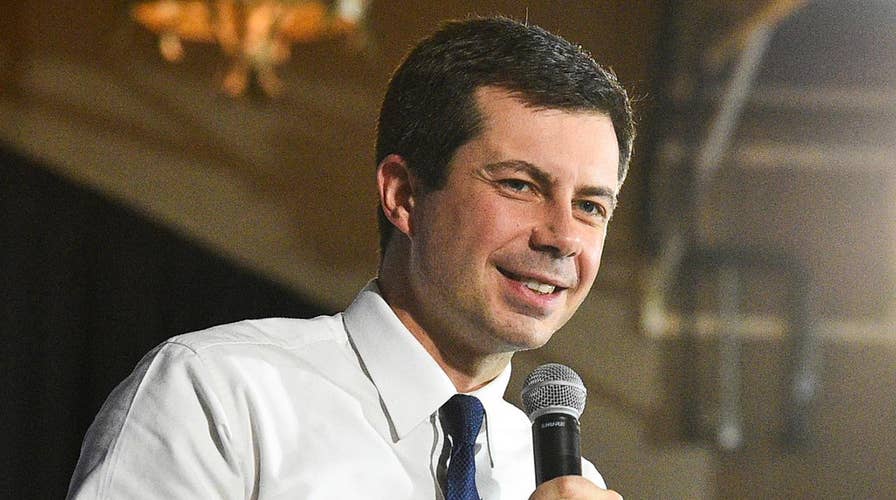Democrats falling out of love with Pete Buttigieg
Reaction and analysis from radio show host Howie Carr.
Democratic presidential hopeful Pete Buttigieg on Monday unveiled a wide-ranging, multibillion-dollar plan to invest in the Latino community and rollback Trump-era policies, as part of an effort to make inroads with Hispanics.
It comes as Buttigieg is trying to improve his standing with minority voters, including African-Americans and Hispanics. A Quinnipiac University national poll this month found that 29 percent of Latinos view Buttigieg favorably.
“The Latino community is an integral force in pushing our nation toward achieving inclusive, progressive ideals. In so many ways, members of the Latino community uphold and embody the values that make us American,” Buttigieg said in a statement. “Despite these contributions, Latinos have been subjected to relentless and bigoted attacks by this president and his administration.”
Called “El Pueblo Unido/A People United: A New Era for Latinos,” the proposal’s aim is to tackle the health, educational and economic disparities in an ethnic group that reached a new high in 2018 with 59.9 million people living across the United States, according to the Pew Research Center.
“As president, I will put an end to this administration’s discriminatory policies and work to dismantle the institutional barriers that have denied Latinos the opportunity to belong in their country," Buttigieg said.
Buttigieg is calling for the elimination of the “public charge rule,” a law currently blocked by federal court that would make an immigrant inadmissible to the country if they are deemed to be dependent on federal government assistance.
“Self-sufficiency has been a basic principle of United States immigration law since this country’s earliest immigration statutes,” according to the rule.
Buttigieg wrote the federal policy will have a “chilling effect on access to health care,” arguing that “immigrant and mixed-status parents with citizen children are hesitating to enroll their children in Medicaid coverage for fear of deportation.”
The South Bend, Ind., mayor also proposed to examine the effects of a “politicized” 2020 Census to ensure the proposed citizenship question – which was blocked by the Supreme Court in June -- did not result in the undercounting of Latino voters.
“The recent push to include citizenship on the census—which we know was done to suppress voter turnout in communities of color—undermines our democracy and could lower the resources allocated to those communities,” Buttigieg wrote.
Buttigieg vowed to “remedy” any negative impacts by working with “federal agencies and Congress to address the effects of any undercount on federal funding.”
Another Trump-era policy Buttigieg calls for reversing is the work requirement for Supplemental Nutrition Assistance Program (SNAP) program, a move that would “likely cut benefits for nearly 700,000 adults.”
A focus of the policy proposal is to address economic inequality. Buttigieg planned to establish a $10 billion fund for entrepreneurs from “underserved communities” in addition to utilizing the Small Business Administration's resources to improve entrepreneurial training and development.
Buttigieg wrote “Latinos are a key part of the economic engine for our country,” adding that he is committed “to investing in Latino-owned businesses and entrepreneurs to level playing field and reduce the racial wealth gap.”
Buttigieg also proposed awarding minority-owned small businesses with 25 percent of the nation’s contracting dollars, totaling $100 billion. He also planned to provide a $1 billion loan guarantee to microlenders with the projection of supporting “over 40,000 new small businesses.”
He also planned to bolster worker protection in industries that are predominately Latino, raise the federal minimum wage to $15 an hour, restore overtime regulations and combat discriminatory business lending.
Another focus of the proposal is to address health inequity in the Latino community. Buttigieg called to “eliminate the five-year waiting period for Green Card holders gaining access to public health insurance programs,” arguing that it will “significantly help Latino immigrants gain access to coverage.”
Buttigieg also touted his "Medicare For All Who Want It" agenda as a way to ensure everyone has access to health care. He also called for increasing investment into mental health services.
“Fueled by this administration’s racist rhetoric and immigration policies, Latino mental health has deteriorated significantly since 2016,” Buttigieg said. “This deterioration has taken place against the backdrop of a broken mental health care system and high stigma towards mental illness in the Latino community.”
He also called to “eliminate disparities in Medicaid funding for Puerto Rico,” which currently receives “block grants that are insufficient in addressing the Medicaid population’s need.” He vowed their Medicaid program will be fully funded.
The policy agenda also outlined a strategy to address environmental inequity.
“Whether it is the disenfranchisement of the people of Puerto Rico or Latino neighborhoods denied access to clean air and water, Latinos in the United States have been burdened for too long by a legacy of systemic discrimination,” Buttigieg said.
Buttigieg met with Hurricane Maria victims in Orlando during a Puerto Rican Roundtable in August, which provided him with input on how to properly address the environmental issues that disproportionally impact minority communities.
CLICK HERE TO GET THE FOX NEWS APP
“Climate change, pollution, and environmental degradation often strike Latino communities first, compounding existing inequities in income, health, and disaster preparedness,” Buttigieg wrote. “Half of Latinos live in the most polluted cities in the country, and even more live in one of three states heavily affected by extreme weather events: sea-level rise and hurricanes in Florida, heat waves in Texas, and droughts in California.”
By increasing funding to the Environmental Protection Agency, Buttigieg planned to combat air pollution by strengthening air quality standards and ensure access to clean drinking water through contamination cleanup programs.
Buttigieg also said he wants to recognize and praise Latino culture by establishing a national museum in Washington.















































